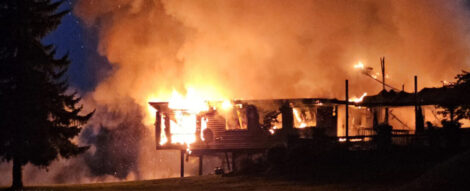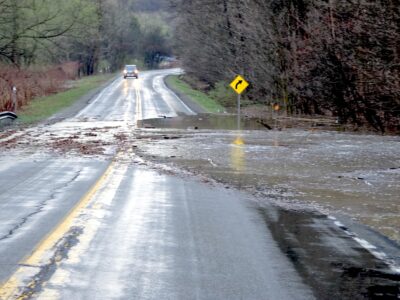GOP Wants State Study Of Renewable Energy
The news of Gov. Andrew Cuomo’s resignation last week scuttled a planned state Assembly and Senate Republican Conference event on clean energy policy.
While the press gathering was scuttled, Republicans have introduced a proposal that would require the Public Service Commission and NYSERDA to conduct a full cost-benefit analysis of renewable energy systems and to compare those costs with other ways of producing electricity. The Senate bill (S.7321) is sponsored by Sen. Dan Stec, R-Glens Falls, and is co-sponsored by Republican senators George Borrello, Peter Oberacker, Sue Serino and Anthony Palumbo. Companion legislation was introduced in May in the Assembly (A.7524) sponsored by Assemblyman Phil Palmesano with nearly the entire Republican contingent in the Assembly as a co-sponsor, including Assemblymen Andrew Goodell and Joe Giglio.
Earlier this year, the Climate and Community Investment Act was introduced by Democrats in the Assembly and Senate. During a public hearing, Kenneth Pokalsky, vice president of the Business Council of New York State, said the council’s analysis showed the proposed state legislation would impose a carbon tax of $55 per ton of fossil fuel emissions from all sources, including schools, factories and on the use of gasoline. That equated to a 55 cent a gallon increase on gasoline taxes and a possible 26% increase on natural gas costs based on historical usage.
WHAT REPUBLICANS WANT
Republicans want a supplemental study of the costs, benefits and technical and economic feasibility of meeting the state’s Climate Leadership and Community Protection Act, which limits the state’s overall greenhouse gas emissions limits by 85% by 2050 and ensures at least 35% of investments from clean energy and energy efficiency funds are invested in disadvantaged communities. The Climate and Community Investment Act is an attempt to begin finding state funding sources to pay for the shift from fossil fuels to renewables in order to meet the CLCPA. The Climate and Community Investment Act is likely to be discussed at some point in the upcoming legislative session.
“As the Climate Action Council (CAC) continues its work on the implementation of the Climate Leadership and Community Protection Act (CLCPA) there have been many projections regarding the significant economic and fiscal implications of full CLCPA implementation; some estimates show it will cost individuals, families, farmers and businesses billions of dollars per year through increased taxes, utility/electric rates/ bills and home and business conversion and retrofit costs,” Stec and Palmesano wrote in their legislative justifications.
Specifically, Republicans want to know the impact of CLCPA renewable energy target compliance on electricity wholesale prices, delivery rates and total bills that energy consumers in this state will pay, including indirect energy costs. The analysis would include the impacts of subsidies to site land-based and offshore renewable energy projects, the build-out of the electric infrastructure to receive and transmit renewable power, subsidies of energy storage projects, and the addition of new loads associated with deep electrification efforts in the residential, commercial, industrial and transportation sectors. The GOP legislators also want to know more about the direct and indirect costs associated with the transition to heating and cooling provided by heat pumps powered by renewable energy systems and the current civilian state of the art in nuclear reactor technology and the role nuclear reactors could play in the transition to a cleaner, more reliable, and more resilient energy portfolio in New York.
The Public Service Commission and NYSERDA would also be asked to evaluate the impact of renewable energy systems on the reliability of the electric system in New York, including voltage sags and how reliability will be maintained when solar and wind resources are not generating power and gas-fired generation is phased out; costs and logistical issues associated with end-of-life disposal of renewable energy system components; and the costs associated with building out and maintaining adequate energy storage/battery capacity for periods when renewable energy systems are intermittent, including charging station infrastructure, a moratorium on gas pipeline construction and over-the-road transport of goods, such as perishable agricultural products.
Finally, Republicans want a firm answer to questions over how CLCPA compliance impacts natural gas market prices, delivery rates and total bills that energy consumers will pay. Assembly members and Senators are also asking for clarification on the impact of the CLCPA on agriculture.
“Given the wide-ranging impact the CLCPA will have on families and businesses, it has become clear that a full, transparent, and detailed process must take place to provide the public with a full accounting of the true and actual financial costs the full implementation of the CLCPA will have on state residents and businesses,” Stec and Palmesano wrote. “While the objective of cleaner air, cleaner water and a more healthful environment is laudable, such objectives must be balanced with the energy needs of a stable, thriving first-world economy, which is and will remain dependent upon both a diverse energy mix and a guaranteed, affordable and reliable supply of on-demand electrical power. The need for, and maintenance of, a reliable electrical grid and the sources to supply it are only going to increase over time, and heretofore insufficient attention has been paid to how reliance upon renewables (specifically wind- and solar-powered generation facilities) will affect the reliability and cost of the electrical grid as well as land use across the state, in addition to many other factors at play.”





